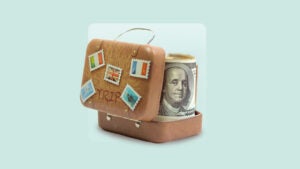What to consider when exchanging currency




If you’re planning an international trip, you’ll have to juggle quite a few requirements before takeoff. But beyond basic tasks like verifying your passport is current, packing up your luggage and writing out your itinerary, you’ll also have to contend with currency exchange.
Knowing how currency exchange works can help you save money, leaving more room in your budget for sightseeing, dining and other cultural experiences. Before you exchange money, you should know how to choose the right place to exchange your money, time your transactions for the best rates and avoid unnecessary fees.
Why knowing about currency exchange matters
Currency exchange is the process of changing one type of currency into another. An exchange rate is the relative value of one country’s money compared to another’s. Exchange rates fluctuate based on factors like political stability, economic conditions and global market activity.
Without a solid understanding of currency exchange, travelers risk losing money on unfavorable exchange rates, excessive fees and even fraudulent practices. However, armed with the knowledge of how currency exchange works and where to do money exchanges, you can confidently navigate the process and secure the best deal for your travel budget.
Currency exchange fees
Exchanging money abroad can involve different fees, so it’s essential to understand what you might encounter and how to avoid the ones you can.
Flat fees
Some exchange providers charge a flat fee per transaction. These can make smaller exchanges expensive relative to the amount you’re converting. Always ask about any flat fees in advance, and consider exchanging larger sums to minimize the impact of this fee.
Percentage fees
Many currency exchange providers charge a percentage-based fee on the total amount exchanged. This fee structure can become costly if you’re exchanging large amounts of money, so compare percentage-based fees before making any decisions.
ATM withdrawal fees
Using an ATM abroad might result in withdrawal fees. The foreign ATM network or bank and your home banking institution can charge these fees. Some banks refund them, while others may partner with international banks to provide fee-free withdrawals.
Before embarking on your travel, check with your bank to understand any potential ATM fees, your reimbursement options (if any) and whether the bank has any financial partners abroad to limit possible withdrawal charges.
Foreign transaction fees
Foreign transaction fees apply when your bank or card issuer charges you for using credit or debit cards abroad or transacting with an overseas merchant online. Not every card charges this fee, but the ones that do usually charge around 1 percent to 3 percent of the transaction amount.
Check your card’s terms and conditions before you travel to avoid surprises. If your card charges foreign transaction fees, opt for other payment methods, like cash or prepaid travel cards. You can also consider signing up for a card with no foreign transaction fees or a travel-focused credit card that offers other perks, such as airport lounge access or cash back.
Best places to exchange currency
Not all currency exchange options are equal, especially for travelers. Currency exchange can happen at a physical location like an airport or online. Some places offer better rates and lower-cost exchange fees, while others provide more convenience. Here’s a breakdown of the most common currency exchange options.
Banks and credit unions
Banks and credit unions are generally the best money exchange options, offering competitive exchange rates and transparent fees. Many banks provide foreign currency services for their account holders, and some even offer currency at a better rate when ordered in advance.
If you have a major bank account, the bank may also offer international ATM withdrawals with little to no fees. Banks tend to have the most secure exchange process, so you can avoid the high costs and markups common at airport exchange booths.
Currency exchange kiosks
Currency exchange kiosks, often found at airports and tourist destinations, are convenient but have significant drawbacks. They frequently offer lower exchange rates and higher fees, taking advantage of travelers who need quick cash.
If you need to use a currency exchange bureau, exchange only a small amount to cover your immediate needs. Once you reach your destination, seek better rates at a local bank or ATM.
ATMs abroad
Using ATMs to withdraw local currency in your destination country is one of the most convenient ways to get cash while traveling. Many banks are part of global ATM networks, allowing you to withdraw money with minimal fees if you use ATMs associated with their partner banks. However, checking with your bank beforehand is vital to understand what fees may apply to international withdrawals.
When using ATMs abroad, stick to machines from reputable banks and avoid independent ATMs found in tourist-heavy areas or small shops. These often have higher fees and less favorable exchange rates. It’s also a good idea to notify your bank of your travel plans to avoid having your card frozen for suspicious activity.
Prepaid travel cards
Prepaid travel cards offer an excellent solution for travelers who want to manage currency exchange more conveniently with less hands-on involvement. These cards allow you to load multiple currencies before traveling and lock in exchange rates to avoid fluctuations abroad.
Prepaid cards work similarly to regular debit or credit cards but have the added benefit of lower foreign transaction fees. However, it’s crucial to be aware of potential hidden costs, such as inactivity, ATM withdrawal or reloading fees. This level of caution and attention to detail can help you avoid unnecessary expenses.
Common currency exchange mistakes
When exchanging currency for travel, it’s easy to fall into traps that result in unnecessary expenses. Here are some common mistakes travelers make and how to avoid them.
1. Exchanging money at airports and hotels
While airports and hotels may be convenient places to exchange money, they often have the worst exchange rates and highest fees. Airport kiosks, in particular, are notorious for inflating rates, sometimes marking them up by as much as 10 percent compared to what you’d find at a local bank or ATM.
To avoid these high costs, exchange a small amount of money before your trip to cover immediate expenses like transportation. Once you arrive at your destination, use ATMs or banks for more favorable rates.
2. Using dynamic currency conversion
Dynamic currency conversion (DCC) allows you to pay in your home currency when using a credit or debit card abroad. While this may seem convenient, it usually comes with a much worse exchange rate and additional hidden fees. Whenever possible, always opt to pay in the local currency of your destination to avoid unfavorable rates.
DCC also gives merchants more control over the exchange rate, meaning they could use a rate that benefits them more than you. When paying with a card abroad, always make sure you’re being charged in the local currency to get the most accurate rate.
Keep in mind that merchants must request permission before applying DCC. You’ll usually see the option to pay in your home currency at the payment terminal. If you choose to convert to U.S. dollars for the transaction, expect a fee of 3 to 12 percent of the total purchase amount.
3. Timing your exchange poorly
Exchange rates fluctuate daily based on global market conditions. If you’re considering exchanging a large sum of money, it pays to keep an eye on exchange rates before your trip. Use tools to track exchange rates and exchange your money when the rate is in your favor.
For travelers planning ahead, some banks and online services allow you to lock in exchange rates before traveling, helping you avoid losses due to unfavorable fluctuations during your trip.
How to maximize savings on currency exchange while traveling
When traveling abroad, currency exchange fees can quickly eat into your budget. You can use certain strategies to help you save, avoid fees and make the most of your money while exploring new destinations.
1. Plan ahead for international trips
Before heading overseas, research your destination’s currency and exchange rate options. Many banks allow you to order foreign currency ahead of time, saving you from the poor exchange rates and high fees at airports or tourist-heavy areas.
Financial institutions sometimes offer special travel accounts or debit cards with reduced fees for foreign transactions. Check with your bank to see if it provides any international-friendly options.
2. Credit cards with no foreign transaction fees
Credit cards that offer no foreign transaction fees can be a great asset when traveling internationally. These cards often offer competitive exchange rates, and some even provide travel rewards or cash back on purchases made abroad. Using a credit card for most of your international purchases can help protect you from currency exchange fees and fraud.
3. Limit currency exchange at high-fee locations
Airports, hotels and currency exchange kiosks all have one thing in common: charging inflated rates for money exchange. Of course, in a pinch, you can always use one of these options, but you won’t be getting a favorable rate in addition to potential charges.
If you can, wait to exchange your money at an ATM or bank for better rates and lower fees.
The bottom line
Currency exchange is just one part of financially planning your international travel, but it can make or break your budget. Take the time to understand the currency rates of your destination countries, plan out how much money you’ll require up front, and find the banks and ATMs you can use to exchange currency ahead of time.
You can stretch your travel budget further by steering clear of hotels and airports for money exchange, using debit or credit cards designed for travel and sticking to reputable financial institutions for transactions.
Travel offers priceless experiences, but that doesn’t mean you have to spend more than you want or can afford. With a little preparation, you’ll be able to get the most out of your money while exploring the world.
Why we ask for feedback Your feedback helps us improve our content and services. It takes less than a minute to complete.
Your responses are anonymous and will only be used for improving our website.
You may also like

Traveling soon? What to lookout for when exchanging money

What are the typical fees associated with money exchange?



